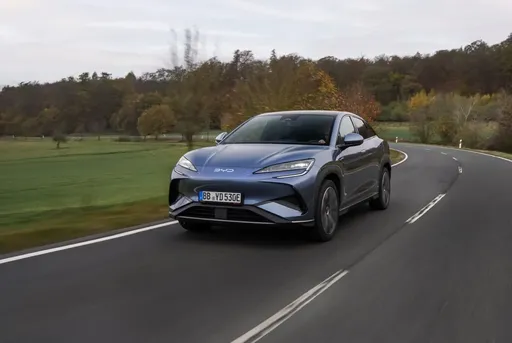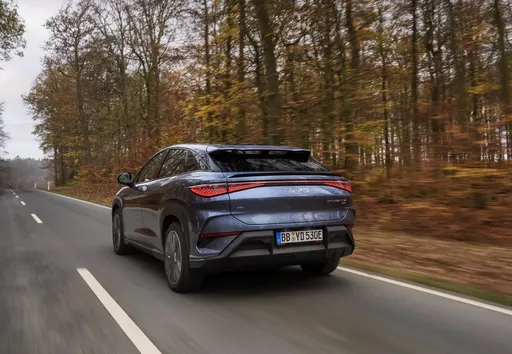Hyundai Kona vs BYD Sealion 7 – Differences & prices compared
Compare performance, boot space, consumption and price in one view.
Find out now: which car is the better choice for you – Hyundai Kona or BYD Sealion 7?
The Hyundai Kona (SUV) comes with a Electric, Petrol or Full Hybrid engine and Automatic or Manuel transmission. In comparison, the BYD Sealion 7 (SUV) features a Electric engine with Automatic transmission.
When it comes to boot capacity, the Hyundai Kona offers 466 L, while the BYD Sealion 7 provides 520 L – depending on how much space you need. If you’re looking for more power, decide whether the 218 HP of the Hyundai Kona or the 530 HP of the BYD Sealion 7 suits your needs better.
In terms of consumption, the values are 14.60 kWh4.60 L per 100 km for the Hyundai Kona, and 19.90 kWh for the BYD Sealion 7.
Price-wise, the Hyundai Kona starts at 23100 £, while the BYD Sealion 7 is available from 42800 £. Compare all the details and find out which model fits your lifestyle best!
Hyundai Kona
The Hyundai Kona blends a bold design with a versatile interior, making it a standout choice in the compact SUV market. Its crisp handling and responsive steering provide an engaging driving experience, whether in the city or on the open road. The vehicle also offers a range of features designed to enhance comfort and connectivity, ensuring a pleasurable journey for both driver and passengers.
details @ hyundai.news
@ hyundai.news
 @ hyundai.news
@ hyundai.news
 @ hyundai.news
@ hyundai.news
 @ hyundai.news
@ hyundai.news
BYD Sealion 7
The Sealion 7 captivates with its striking design and impressive performance that appeals to both enthusiasts and casual drivers alike. With a focus on comfort and advanced technology, this model redefines the driving experience, making every journey enjoyable. Its sleek silhouette coupled with an innovative interior showcases the perfect blend of style and functionality.
details @ BYD
@ BYD
 @ BYD
@ BYD
 @ BYD
@ BYD

|

|
|
|
|
Costs and Consumption |
|
|---|---|
|
Price
23100 - 41600 £
|
Price
42800 - 52300 £
|
|
Consumption L/100km
4.6 - 7 L
|
Consumption L/100km
-
|
|
Consumption kWh/100km
14.6 - 16.8 kWh
|
Consumption kWh/100km
19.9 - 21.9 kWh
|
|
Electric Range
377 - 514 km
|
Electric Range
456 - 502 km
|
|
Battery Capacity
1.3 - 65.4 kWh
|
Battery Capacity
-
|
|
co2
0 - 163 g/km
|
co2
0 g/km
|
|
Fuel tank capacity
38 - 47 L
|
Fuel tank capacity
-
|
Dimensions and Body |
|
|---|---|
|
Body Type
SUV
|
Body Type
SUV
|
|
Seats
5
|
Seats
5
|
|
Doors
5
|
Doors
4
|
|
Curb weight
1370 - 1773 kg
|
Curb weight
2225 - 2435 kg
|
|
Trunk capacity
466 L
|
Trunk capacity
520 L
|
|
Length
4350 - 4385 mm
|
Length
4830 mm
|
|
Width
1825 mm
|
Width
1925 mm
|
|
Height
1580 - 1585 mm
|
Height
1620 mm
|
|
Payload
420 - 490 kg
|
Payload
410 kg
|
Engine and Performance |
|
|---|---|
|
Engine Type
Electric, Petrol, Full Hybrid
|
Engine Type
Electric
|
|
Transmission
Automatic, Manuel
|
Transmission
Automatic
|
|
Transmission Detail
Manual Gearbox, Dual-Clutch Automatic
|
Transmission Detail
Reduction Gearbox
|
|
Drive Type
Front-Wheel Drive, All-Wheel Drive
|
Drive Type
Rear-Wheel Drive, All-Wheel Drive
|
|
Power HP
115 - 218 HP
|
Power HP
313 - 530 HP
|
|
Acceleration 0-100km/h
7.8 - 11.9 s
|
Acceleration 0-100km/h
4.5 - 6.7 s
|
|
Max Speed
162 - 210 km/h
|
Max Speed
215 km/h
|
|
Torque
200 - 265 Nm
|
Torque
380 - 690 Nm
|
|
Number of Cylinders
3 - 4
|
Number of Cylinders
-
|
|
Power kW
85 - 160 kW
|
Power kW
230 - 390 kW
|
|
Engine capacity
998 - 1598 cm3
|
Engine capacity
-
|
General |
|
|---|---|
|
Model Year
2024 - 2025
|
Model Year
2024
|
|
CO2 Efficiency Class
A, D, C, E, F
|
CO2 Efficiency Class
A
|
|
Brand
Hyundai
|
Brand
BYD
|
Hyundai Kona
The Hyundai Kona: A Comprehensive Overview
The Hyundai Kona has established itself as a standout in the compact SUV segment, blending innovation with performance and style. As the automotive world moves towards more sustainable and efficient options, the Kona offers a variety of powertrains, from traditional petrol engines to full hybrids and all-electric models.
Powertrain Options and Performance
The Hyundai Kona's powertrain choices cater to a wide range of preferences. For petrol enthusiasts, the Kona offers a 1.0L T-GDI engine, delivering 100 PS, and a more robust 1.6L T-GDI variant with up to 170 PS. Those looking for efficiency without sacrificing power can consider the full hybrid model, offering 129 PS and an impressive consumption of 4.5 L/100km.
For a greener option, the all-electric Kona provides a compelling case. With battery capacities of up to 65.4 kWh, the electric Kona offers power outputs of 156 to 218 PS, and efficiencies as low as 14.6 kWh/100km, enabling an electric range of up to 513 km.
Technical Specifications and Innovations
Built on a robust platform, the Kona delivers versatility and reliability. With a choice between manual or dual-clutch automatic gearboxes, along with options for front-wheel or all-wheel drive, the Kona ensures a tailored driving experience. The handling is enhanced by the car's lightweight construction, balancing a 1370 to 1773 kg curb weight with dynamic performance.
The Kona's design doesn't compromise cargo space for style; it offers a generous 466 L boot capacity. With a relatively compact body, measuring 4350 to 4385 mm in length, the Kona easily navigates urban environments while still commanding a strong road presence with its 1825 mm width.
Efficiency and Eco-Friendliness
Hyundai is committed to reducing emissions, as evidenced by the Kona's CO2 efficiency ratings, which range from class A for electric models to class D for some higher-performance petrol variants. The focus on reducing environmental impact without sacrificing driving pleasure is notable throughout the Kona range.
Costing and Value
The Hyundai Kona offers commendable value for money. Pricing starts at €26,400 and reaches up to €50,690, depending on the chosen configuration. The monthly running costs range from €956 to €1090, with a cost per kilometre of 38.3 to 43.6 cents, making it a competitive option in its class.
Conclusion: Modern, Efficient, and Versatile
The Hyundai Kona stands as a testament to Hyundai's commitment to innovation, efficiency, and practicality. Whether you are inclined towards a traditional combustion engine, a hybrid for a balance of power and efficiency, or a full electric model for maximum eco-friendliness, the Kona provides a tailored solution for each unique driver preference.
BYD Sealion 7
The automotive landscape is evolving faster than ever, and one model capturing significant attention is the BYD Sealion 7. This electric SUV not only marries performance with sustainability but also boasts innovations that redefine user expectations. Let’s dive into the technical aspects and standout innovations of this remarkable vehicle.
Powerful Performance and Versatile Configurations
The BYD Sealion 7 comes in several configurations, catering to diverse performance needs. It offers two versions of electric all-wheel drive, producing an impressive 530 horsepower, while the rear-wheel drive variant delivers a solid 313 horsepower. This spectrum of power allows drivers to select an option that aligns with their driving style and requirements.
Acceleration is another noteworthy aspect of the Sealion 7. The rear-wheel drive model achieves 0-100 km/h in just 6.7 seconds, while the all-wheel drive variant does it in a breathtaking 4.5 seconds. This combination ensures that the Sealion 7 doesn’t just compete; it leads in performance within its segment.
Innovative Electric Drive and Efficiency
Equipped with a cutting-edge reduction gearbox, the BYD Sealion 7 not only delivers incredible acceleration but also underscores efficiency with a consumption rate as low as 19.9 kWh per 100 km for the most efficient model. The all-wheel drive variants have slightly higher consumption rates of 21.4 kWh and 21.9 kWh, respectively, but they still perform admirably when it comes to efficiency.
In terms of electric range, the Sealion 7 showcases a commendable performance. Depending on the specific configuration, it offers ranges between 456 and 502 km on a single charge, making it a competitive choice for those concerned about range anxiety typical of electric vehicles.
Sleek Design and Practicality
Beyond performance and efficiency, the BYD Sealion 7 impresses with its aesthetic appeal and practicality. With dimensions of 4830 mm in length, 1925 mm in width, and 1620 mm in height, this SUV is designed for presence. Moreover, the spacious interior comfortably accommodates up to five passengers, enhancing its usability for families and adventure seekers alike.
Practical features like a trunk capacity of 520 liters ensure that the Sealion 7 stands ready for any journey, whether it’s a weekend road trip or daily commuting. Additionally, the vehicle has a payload capacity of up to 410 kg, providing flexibility for carrying cargo without sacrificing comfort.
Safety and Eco-Friendliness
The BYD Sealion 7 also excels in safety and sustainability. It holds a CO2 efficiency class of A, making it an environmentally friendly option with zero emissions during operation. This aligns with the growing consumer demand for greener transportation solutions.
Furthermore, the vehicle is engineered with multiple safety features that ensure a secure driving experience for all occupants, a crucial element that underscores the ongoing commitment by BYD to safety in electric vehicles.
Final Thoughts
As an emblem of electrification in the automotive industry, the BYD Sealion 7 stands out with its combination of powerful performance, innovative technology, and eco-friendly credentials. For those exploring the electric SUV market, this vehicle represents a significant milestone, offering a compelling argument for drivers looking to transition to a more sustainable yet thrilling driving experience.
What drive types are available for the Hyundai Kona?
Available configurations include Front-Wheel Drive or All-Wheel Drive.
The prices and data displayed are estimates based on German list prices and may vary by country. This information is not legally binding.
